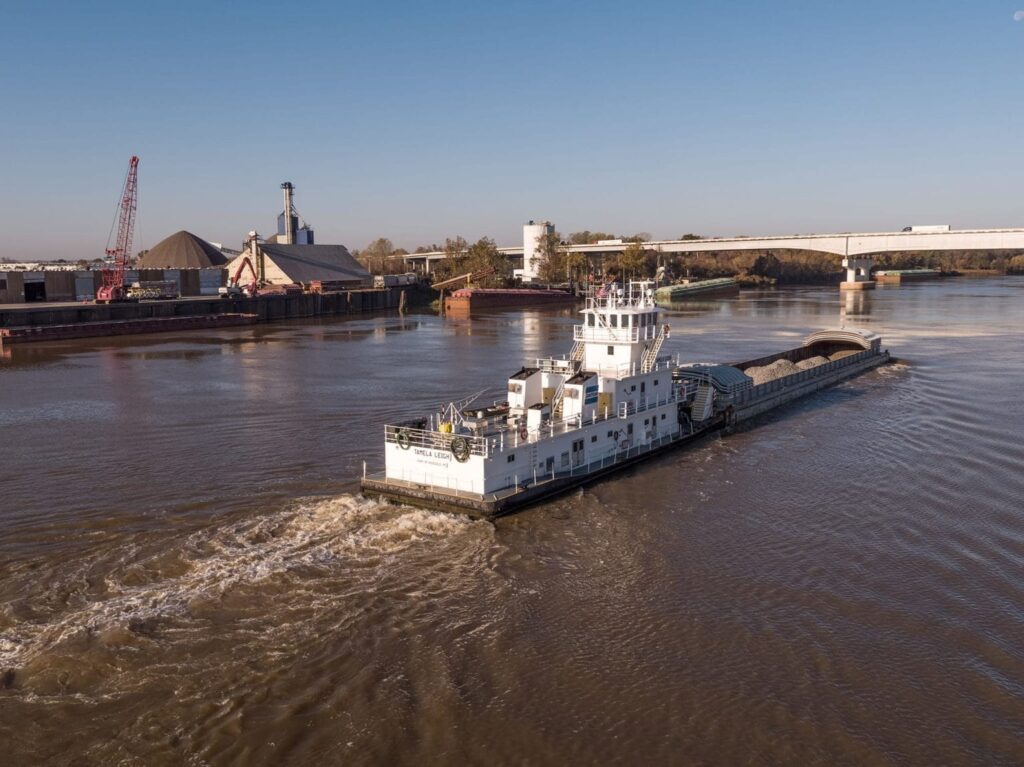Did you know that transporting goods by river barge is one of the best ways to move bulk items at a low cost? Water transport is environmentally responsible and fuel efficient, and barges can carry massive amounts of goods—even if those goods are very large or heavy.
Read on to learn how shipping using America’s inland river system is a safe, cost-effective, and energy-efficient way to transport cargo.
Benefits of River Transportation Energy Efficiency
When comparing rail, truck, and water, shallow-draft water transportation is the most energy-efficient method of freight transportation for moving bulk raw materials. The number of miles one ton can be carried per gallon of fuel shows why.
Per one gallon of fuel:
- A truck can carry one ton of cargo just 59 miles.
- By rail, one ton of cargo can travel 202 miles.
- An inland barge can carry one ton of cargo 514 miles.
Economical Benefits
Thanks to low operating costs, river transportation is an economical choice. Rivers require much less frequent maintenance than roads and railways do to keep things running smoothly. Excessive cargo weight can be a problem for modes of transportation like truck or rail. River barges, on the other hand, can carry extreme volumes of products and materials. For example, a barge holds 1,500 tons of cargo—as much as 60 semi trailers or 15 rail cars. This makes fuel expenses low in comparison to other shipping methods. River barge shipping has extensive national coverage, making it a boon to local, national, and even global economies. The United States has over 25,000 miles of navigable waters that connect our cities and provide access to international shipping.
↪ Did You Know? According to Union Pacific, ships carry approximately 90% of the world’s manufactured goods.
Environmental Impact
In general, water transport has a lower carbon footprint than other modes of shipping. When comparing the total volume of emissions across truck, rail, water, and air freight transportation, water transport is one of the most environmentally responsible.
Another environmental benefit of water transport is that it causes less air and noise pollution. Additionally, barges’ double-hulled construction provides strong protection against spills of hazardous liquid.
Safety Benefits
Compared to truck or rail, water transportation involves less urban exposure and fewer intersections with other traffic, making incidents like collisions very rare. In addition, inclement weather is less likely to impact barge shipments—the same can’t be said for air and road travel.
Another benefit of river barge transportation is its ability to ship a wide variety of materials safely. Air transport, for example, has restrictions on liquids such as oil or other items that can be dangerous on planes, such as lithium batteries.
The Port of Little Rock: An Excellent Choice for Shipping
Shipping by river is one of the least expensive transportation modes. Barges have high carrying capacities, with few restrictions on cargo size or weight. Water transportation is fuel-efficient and has fewer harmful impacts on the environment than other methods of shipping.
The Port of Little Rock takes advantage of the benefits of waterway transportation with two full-service waterway terminals: a river terminal that transports both west and east on the Arkansas River and a slackwater harbor that provides direct river access. Our Port is an exceptionally convenient transportation hub that connects Little Rock to the rest of the country and the world.


